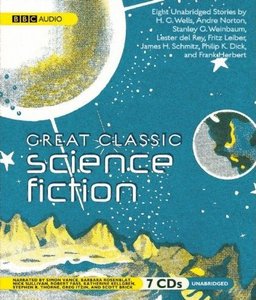 I found this collection on my local library shelves. I’m an audio junkie. (Surprising confession from the director of a radio drama group, I know.) If you follow me on Goodreads, you know I usually have three books going at once: a non-fiction book or novel, a graphic novel or comic collection, and an audio book. This collection featured reading by some notable voice talent, including Scott Brick, who’s a favorite of mine. It seemed like a natural for me. I don’t read enough short stories, and the SF genre thrives on short stories. They’re also better for listening than long, complicated novels. I listen while driving and working, so I can become distracted and lose the thread pretty easily. (I hope none of my narrating colleagues who see this are offended. I lose the thread when I’m talking, too. It’s not personal!)
I found this collection on my local library shelves. I’m an audio junkie. (Surprising confession from the director of a radio drama group, I know.) If you follow me on Goodreads, you know I usually have three books going at once: a non-fiction book or novel, a graphic novel or comic collection, and an audio book. This collection featured reading by some notable voice talent, including Scott Brick, who’s a favorite of mine. It seemed like a natural for me. I don’t read enough short stories, and the SF genre thrives on short stories. They’re also better for listening than long, complicated novels. I listen while driving and working, so I can become distracted and lose the thread pretty easily. (I hope none of my narrating colleagues who see this are offended. I lose the thread when I’m talking, too. It’s not personal!)
Standouts were “Victory” by Lester Del Rey and “The Moon is Green” by Fritz Lieber. “Victory” was probably the longest work in the book, and only the second or third Del Rey work I’ve read. (I narrated his Badge of Infamy for the Sffaudio challenge a while back, and enjoyed that.) This is a tale about war and the cost of it, particularly the cost to the civilian populations for which the warriors claim to be fighting. There’s a gripping, emotional scene where a soldier returns home to find a ruined city, and finds the woman who used to be his wife, now descended to savagery. She condemns him for being one of the lucky ones, the ones who didn’t have to pay the real price of war.
In “The Moon is Green,” one of two stories set in an underground city on a post-nuclear war earth, a woman longs for the outside and meets a man from above, a sort of mutant Peter Pan, who spins a tale of a beautiful fairy land where magical creatures have adapted to the new environment. He offers to take her there, over the objections of her anal-retentive husband.
“The Defenders” by Philip K. Dick is the other post-nuclear-war story. This one also focuses on a married couple holed up in an underground city. In this case, though, the war isn’t over. It goes on above, fought by robots called “Leadies,” who send to the humans images of how they’re destroying the cities above and each other, and will presumably communicate when the war ends and it’s safe for life on the surface to resume. The robots have their own agenda though, it turns out.
I enjoyed the short Andre Norton story “All Cats Are Gray,” a nice character piece about a woman who can’t see color, but has a memory both photographic and encyclopedic.
“The Door in the Wall,” by H.G. Wells was, um, short. Yeah. That’s what I can say about it. I’m not a huge Wells fan. He can turn quite a beautiful phrase, and I do enjoy both The Time Machine and The Invisible Man, but on the whole I find his characterization non-existent and his narrative lacking in emotional power. Of course he’s an Englishman born in the 19th Century, so that’s partly just his acclimatization. It doesn’t help that he and I are also politically far apart. Wells was one of those early adopters of socialist ideals, and I’m a leftover Enlightenment aficionado.
Don’t actually recall “The Winds of Time” by James H. Schmitz. Actually had to look it up even to comment on it. Even the summary didn’t do it for me. Had to actually pull the text from Gutenberg. Oh, yeah. It’s the one about Gefty and the janadra. What’s the janandra? I don’t remember. Not a good read-aloud story for the attention deficit.
Got lost in the Stanley Weinbaum one, “A Martian Odyssey.” Read out loud, a lot of the dialogue from the obligatory aboriginal aliens was annoying. Might be a different experience reading the story. And, of course, aboriginal aliens might not have been quite as much of a cliche when Weinbaum wrote this in 1949.
All in all, though, a nice collection of SF tales from the days when the short story was pretty much the form for the genre. Most are from the 1950s, with Weinbaum’s at the tale end of the forties (though it feels a bit like a John Carter era tale) and Wells’s from 1911. As you can see by the links, they’re all in public domain. The readers, however, are excellent, even when the stories don’t necessarily lend themselves to reading.
